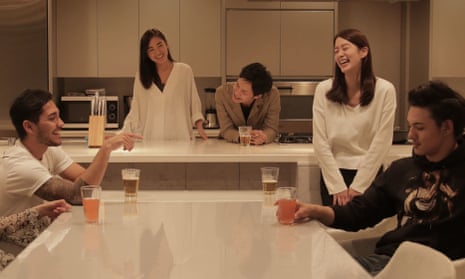The most feverishly discussed show on Netflix right now isn’t an outrageous sadcom featuring a middle-aged comic playing a horse. Rather, the streaming giant’s biggest sleeper hit is a Japanese reality show – in which almost nothing happens at all.
Japanese television might come with a whole host of traumatic associations – the country is famous for its wacky gameshows featuring people eating household objects and performing sex acts on each other. But reality show Terrace House is light years away from that kind of Technicolor debauchery. A dating programme in which three boys and three girls move into an impeccably stylish house (the terrace of the title doesn’t refer to an Anglophilic two-up, two-down, sadly, but a balcony), the contestants’ budding romances move at a snail’s pace – months in and they are still trying to negotiate their way of the friendzone, let alone cross the border into each other’s beds. Love Island this most certainly isn’t.
So what exactly is the appeal? On the Adam Buxton podcast, the comedian Mae Martin explained how she had become enchanted by the show, describing it as “incredibly dull, but so comforting”. It’s true that watching Terrace House is an extremely meditative experience. The contestants are visions of chic, understated style, who spend their time discussing riveting topics such as “who is at work”, “what they ate for dinner” and – very occasionally – “who they fancy”, in a manner so polite and restrained it’s almost hypnotic. Yet despite the narrative crawling along, you can’t simply scroll through Instagram to pass the time – instead, you’re forced to keep your eyes glued to the screen lest you lose track of the subtitles. It’s impossible to multitask while watching Terrace House – the show will have you remembering how it felt to have a pre-social media attention span in no time.
The (in)action on Terrace House is interspersed with commentary from a panel of TV personalities and comedians (plus a 14-year-old schoolboy, for the mandatory dose of cuteness known as “kawaii”), who drill down into banal conversations and overanalyse facial twitches or physical gestures. Not only are these observations and jokes, which could have so easily been lost in translation, still funny, but this level of analysis feels strangely generous – it suggests, as Andrew Ridker put it in the New York Times, that “these young people’s lives are worthy of examination, however pedestrian they might be”.
And unlike the roll call of tiresome eccentrics that have graced every British reality show since the dawn of time, these contestants actually seem human. They couldn’t be less attention-seeking or exhibitionist – despite their constant boozing. Indeed, in one scene the contestants watch the new trailer for their series and look genuinely alarmed by the amount of views it has racked up in a matter of hours.
At a time when we’ve become inured to the slippery world of “structured reality”, which combines documentary and drama to produce something with the value of neither, it feels refreshing that a story producer clearly hasn’t been within a hundred miles of the Terrace House narrative – nobody in their right mind would map out something this uneventful. Instead, the contestants’ muted behaviour provides room to properly witness the universal minutiae of human interaction – the minor disappointments and thrills of the early days of a relationship are stretched out over realistically long time periods.
For those who hold the basic tenets of reality TV dear – that the truth is more compelling than fiction, and the interaction between people is a limitless source of entertainment and fascination, regardless of their status – Terrace House is a profound joy. It might also be one of the shows to stick most closely to those ideals. For everybody who has been consistently disappointed with the gulf between the principles of reality TV and the actual reality, Terrace House might be the genre’s saving grace.

Comments (…)
Sign in or create your Guardian account to join the discussion